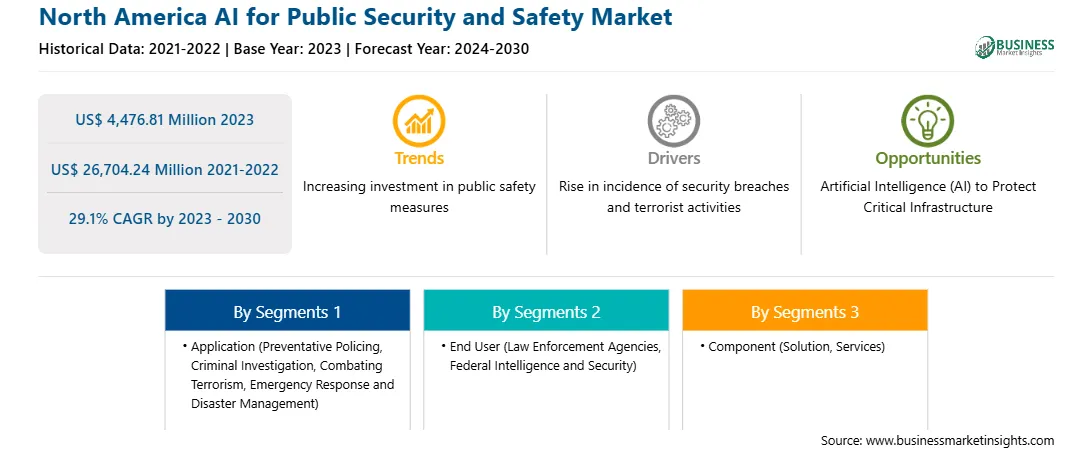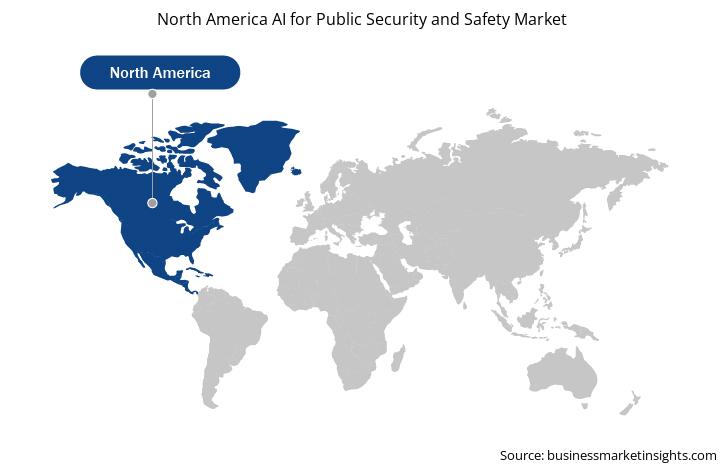North America AI for Public Security and Safety Market
No. of Pages: 142 | Report Code: BMIRE00028712 | Category: Technology, Media and Telecommunications
No. of Pages: 142 | Report Code: BMIRE00028712 | Category: Technology, Media and Telecommunications
City corporations and authorities are modifying their processes, technological capabilities, and approaches to serve citizens efficiently and meet the ever-changing needs of societies. Artificial intelligence (AI) can improve the processes defined to detect security risks and effectively respond to them. Advancements in video surveillance technology can also yield productive results. In smart cities, AI-integrated technologies are often employed to perform tasks that humans would otherwise find difficult. Besides, a smart city is a fast-growing concept in urban setups, combining technology and innovation to improve citizens' quality of life and promote sustainability. The US has the highest number of smart cities, with 50 cities that have adopted smart city technologies, followed by China and India with 45 and 25 smart cities, respectively.
According to Optics Mag, the US surveillance camera market value is expected to reach US$ 21 billion in 2023. A study by Comparitech states that Delhi (India) has over 1,800 surveillance cameras per square mile. AI-powered video analytics aid in the intelligent and accurate classification of objects (people, cars, etc.) and navigation on roads. When machines tag data in live and recorded video, responders and investigators can identify the people, objects, or movements more quickly and easily, saving hours of trawling through surveillance footage. Such data insights can save the lives of first responders and civilians during emergencies. Public safety is much more than law enforcement and emergency responses, and it also includes proactive measures taken by cities to prevent different incidents and mishaps. For instance, the University of Tennessee in Chattanooga conducted research to better understand the reasons for road accidents and ways of preventing them. With the help of multiple sensors and historical data, the Center for Urban Informatics and Progress of this university developed an AI-based model that could be used to predict accidents and improve resource planning and deployment to manage crises and avoid accidents. The data was shared on a map-based collaboration platform where organizations across the city—from emergency service departments to the Department of Transportation—could access the model, view the results, and plan accordingly. Security systems help respond to incidents and enhance safety measures while providing information to the stipulated authorities to improve operations and overall experiences. The system architecture consists of AI modules with machine learning (ML) algorithms, IoT technology and sensors, smart drones, intelligent video surveillance, data analysis, and cybersecurity modules, which can efficiently protect citizens and their data from criminals while providing high speed and accuracy. Therefore, the growing number of smart cities, transit organizations, and public-facing businesses are expected to boost North America AI for public security and safety market.
Various countries in North America are continuously deploying AI technologies to improve public safety and security. By 2030, a typical North American city is likely to rely significantly upon AI for public security and safety. The major AI-based technologies implemented in these cities include a camera for surveillance that can detect anomalies detecting possible crime, the use of drones, and predictive policing. There are legitimate concerns that policing incorporating AI can become overbearing or pervasive in some contexts; however, AI can enable policing to become more targeted when needed. AI can also help remove some of the biases inherent in human decision-making. Further, CompStat, the New York Police Department’s first tool focused on predictive policing, is used by many police departments across the country. In North America, AI is also used by the US Transportation Security Administration (TSA), Coast Guard, and many other security agencies to increase their reliance to enable significant efficiency and efficacy improvements. For instance, the TSA is working on a project to redo airport security in US airports. TSA uses DARMS, a system that is designed to improve the efficiency and efficacy of airport security by relying on personal information to assign security based on a person’s risk categorization and the number of flights taken. The aim of this project is to construct a tunnel that checks people’s security while they walk through it. Thus, the growing use of AI-based technology for airport security is fueling the growth of the market in North America.
Strategic insights for the North America AI for Public Security and Safety provides data-driven analysis of the industry landscape, including current trends, key players, and regional nuances. These insights offer actionable recommendations, enabling readers to differentiate themselves from competitors by identifying untapped segments or developing unique value propositions. Leveraging data analytics, these insights help industry players anticipate the market shifts, whether investors, manufacturers, or other stakeholders. A future-oriented perspective is essential, helping stakeholders anticipate market shifts and position themselves for long-term success in this dynamic region. Ultimately, effective strategic insights empower readers to make informed decisions that drive profitability and achieve their business objectives within the market. The geographic scope of the North America AI for Public Security and Safety refers to the specific areas in which a business operates and competes. Understanding local distinctions, such as diverse consumer preferences (e.g., demand for specific plug types or battery backup durations), varying economic conditions, and regulatory environments, is crucial for tailoring strategies to specific markets. Businesses can expand their reach by identifying underserved areas or adapting their offerings to meet local demands. A clear market focus allows for more effective resource allocation, targeted marketing campaigns, and better positioning against local competitors, ultimately driving growth in those targeted areas.
North America AI for Public Security and Safety Strategic Insights

North America AI for Public Security and Safety Report Scope
Report Attribute
Details
Market size in 2023
US$ 4,476.81 Million
Market Size by 2030
US$ 26,704.24 Million
Global CAGR (2023 - 2030)
29.1%
Historical Data
2021-2022
Forecast period
2024-2030
Segments Covered
By Application
By End User
By Component
Regions and Countries Covered
North America
Market leaders and key company profiles
North America AI for Public Security and Safety Regional Insights

North America AI for Public Security and Safety Market Segmentation
The North America AI for public security and safety market is segmented into application, end user, component, and country.
Based on application, the North America AI for public security and safety market is segmented into preventative policing, criminal investigation, combating terrorism, emergency response and disaster management, and others. In 2023, the preventative policing segment registered a largest share in the North America AI for public security and safety market.
Based on component, the North America AI for public security and safety market is bifurcated into solution and services. In 2023, the solution segment registered a larger share in the North America AI for public security and safety market.
Based on end-use industry, the North America AI for public security and safety market is segmented into law enforcement agencies, federal intelligence and security, and others. In 2023, the law enforcement agencies segment registered a largest share in the North America AI for public security and safety market.
Based on country, the North America AI for public security and safety market is segmented into the US, Canada, Mexico. In 2023, the US segment registered a largest share in the North America AI for public security and safety market.
Hexagon AB, Atos SE, Motorola Solutions Inc, Honeywell International Inc, Hitachi Ltd, Veritone Inc, International Business Machines Corp, XenonStack Pvt Ltd, Voyager Labs Ltd, and Thales SA are the leading companies operating in the North America AI for public security and safety market.
The North America AI for Public Security and Safety Market is valued at US$ 4,476.81 Million in 2023, it is projected to reach US$ 26,704.24 Million by 2030.
As per our report North America AI for Public Security and Safety Market, the market size is valued at US$ 4,476.81 Million in 2023, projecting it to reach US$ 26,704.24 Million by 2030. This translates to a CAGR of approximately 29.1% during the forecast period.
The North America AI for Public Security and Safety Market report typically cover these key segments-
The historic period, base year, and forecast period can vary slightly depending on the specific market research report. However, for the North America AI for Public Security and Safety Market report:
The North America AI for Public Security and Safety Market is populated by several key players, each contributing to its growth and innovation. Some of the major players include:
The North America AI for Public Security and Safety Market report is valuable for diverse stakeholders, including:
Essentially, anyone involved in or considering involvement in the North America AI for Public Security and Safety Market value chain can benefit from the information contained in a comprehensive market report.